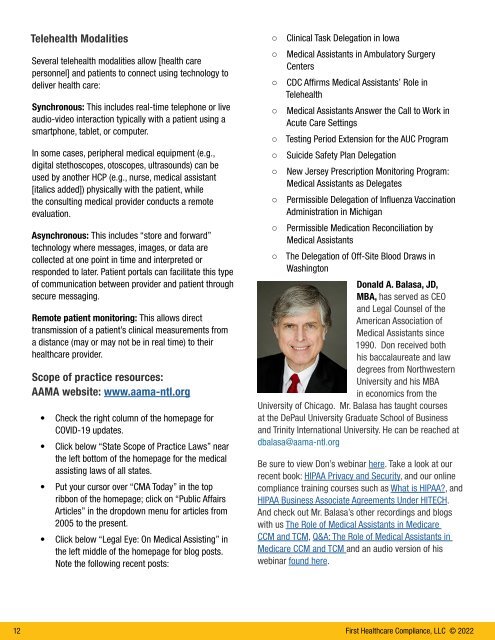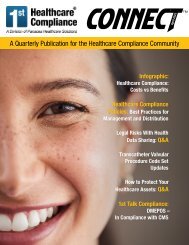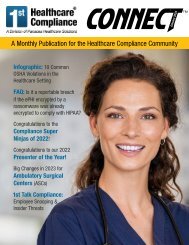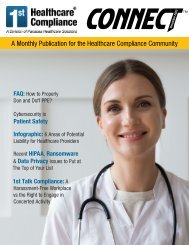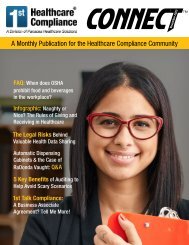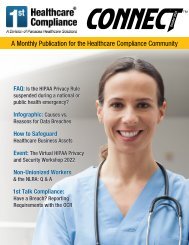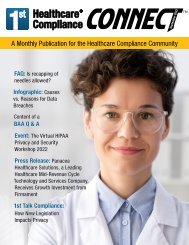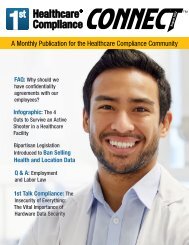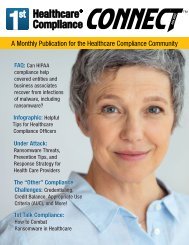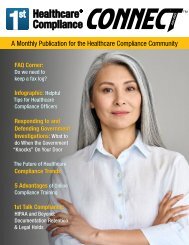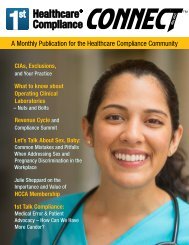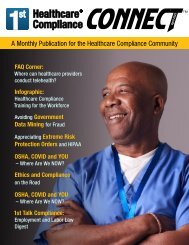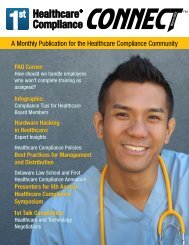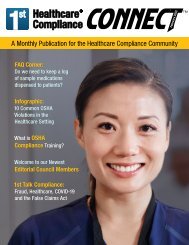First Healthcare Compliance CONNECT January 2022
Create successful ePaper yourself
Turn your PDF publications into a flip-book with our unique Google optimized e-Paper software.
Telehealth Modalities<br />
Several telehealth modalities allow [health care<br />
personnel] and patients to connect using technology to<br />
deliver health care:<br />
Synchronous: This includes real-time telephone or live<br />
audio-video interaction typically with a patient using a<br />
smartphone, tablet, or computer.<br />
In some cases, peripheral medical equipment (e.g.,<br />
digital stethoscopes, otoscopes, ultrasounds) can be<br />
used by another HCP (e.g., nurse, medical assistant<br />
[italics added]) physically with the patient, while<br />
the consulting medical provider conducts a remote<br />
evaluation.<br />
Asynchronous: This includes “store and forward”<br />
technology where messages, images, or data are<br />
collected at one point in time and interpreted or<br />
responded to later. Patient portals can facilitate this type<br />
of communication between provider and patient through<br />
secure messaging.<br />
Remote patient monitoring: This allows direct<br />
transmission of a patient’s clinical measurements from<br />
a distance (may or may not be in real time) to their<br />
healthcare provider.<br />
Scope of practice resources:<br />
AAMA website: www.aama-ntl.org<br />
• Check the right column of the homepage for<br />
COVID-19 updates.<br />
• Click below “State Scope of Practice Laws” near<br />
the left bottom of the homepage for the medical<br />
assisting laws of all states.<br />
• Put your cursor over “CMA Today” in the top<br />
ribbon of the homepage; click on “Public Affairs<br />
Articles” in the dropdown menu for articles from<br />
2005 to the present.<br />
• Click below “Legal Eye: On Medical Assisting” in<br />
the left middle of the homepage for blog posts.<br />
Note the following recent posts:<br />
○<br />
○<br />
○<br />
○<br />
○<br />
○<br />
○<br />
○<br />
○<br />
○<br />
Clinical Task Delegation in Iowa<br />
Medical Assistants in Ambulatory Surgery<br />
Centers<br />
CDC Affirms Medical Assistants’ Role in<br />
Telehealth<br />
Medical Assistants Answer the Call to Work in<br />
Acute Care Settings<br />
Testing Period Extension for the AUC Program<br />
Suicide Safety Plan Delegation<br />
New Jersey Prescription Monitoring Program:<br />
Medical Assistants as Delegates<br />
Permissible Delegation of Influenza Vaccination<br />
Administration in Michigan<br />
Permissible Medication Reconciliation by<br />
Medical Assistants<br />
The Delegation of Off-Site Blood Draws in<br />
Washington<br />
Donald A. Balasa, JD,<br />
MBA, has served as CEO<br />
and Legal Counsel of the<br />
American Association of<br />
Medical Assistants since<br />
1990. Don received both<br />
his baccalaureate and law<br />
degrees from Northwestern<br />
University and his MBA<br />
in economics from the<br />
University of Chicago. Mr. Balasa has taught courses<br />
at the DePaul University Graduate School of Business<br />
and Trinity International University. He can be reached at<br />
dbalasa@aama-ntl.org<br />
Be sure to view Don’s webinar here. Take a look at our<br />
recent book: HIPAA Privacy and Security, and our online<br />
compliance training courses such as What is HIPAA?, and<br />
HIPAA Business Associate Agreements Under HITECH.<br />
And check out Mr. Balasa’s other recordings and blogs<br />
with us The Role of Medical Assistants in Medicare<br />
CCM and TCM, Q&A: The Role of Medical Assistants in<br />
Medicare CCM and TCM and an audio version of his<br />
webinar found here.<br />
12<br />
<strong>First</strong> <strong>Healthcare</strong> <strong>Compliance</strong>, LLC © <strong>2022</strong>


